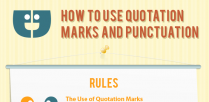Indefinite and definite articles, such as “a”, “an” and “the”, describe and modify nouns. Articles and niggling little words known as determiners and quantifiers convey general and specific information. Articles tell the reader what you’re talking about and how much there is. Adults and advanced ESL students can run into many challenging situations where abstract and collective nouns make it difficult to decide whether to use “a”, “an” or “the.” In fact, article-related errors are one of the most frequent grammatical mistakes among ESL students representing 11% of all errors.
To download high resolution poster click here.
Embed this image to your site:
Specific or Non-Specific?
Children beginning English have an advantage as they learn article rules with basic nouns, such as a cat, a dog, an elephant and the cows. In many cases, “a”/”an” and “the” can be used interchangeably without drastically affecting the meaning. If the noun is general or non-specific, the indefinite article “a” or “an” can be used. If you are providing information about a specific noun, ‘the” is required. Here are a few article examples:
We watched a movie last weekend.
The movie nominated for an Oscar.
Count and Non-Count
Words that follow plural rules are known as countable nouns. Countable nouns also follow the basic rules for indefinite and definite articles. However, it’s the non-countable nouns you have to watch out for. Non-countable nouns include words that can’t be pluralized or already represent more than one. Non-countable nouns include mice, money, foliage, pain, milk, water etc. If you can’t add an “S”, the word uses “the.” For example:
The pain is unbearable.
When the master is away, the mice will play.
Zero Article
Non-count and generic plural words are often used without articles. Languages, academic courses, sports and many geographic terms, including the names countries, cities, states and streets are zero article words. Here are a few zero article examples:
Would you like wine with dinner?
Would you like milk with your coffee?
Everyone loves brownies.
The class is learning Swahili.
Time is money.
Vowels, Silent Letters, and Acronyms
Using “an” instead of “a” isn’t always straight forward. In fact, some vowels require an “a” phonetically. When a word like “university” begins with the name of its first letter, it can be paired with an “a”. The letter “H” also presents some trouble because it can be silent as in “an hour” or pronounced like “a historian”. Here are a few article examples:
Mr. Berg is a history teacher.
John is a university student.
Clara wants a unicorn.
The Exceptions
Some words are naturally challenging because they don’t follow the rules. Fortunately, some of these exceptions have their own guidelines. While countries, cites and states don’t require articles, nationalities, rivers, forests, deserts and some general geographic regions do require articles. For example:
The banks of the Nile are fertile farmlands.
Tom’s family went to Kansas to see the Great Plains.
Acronyms are tricky because letters can have vowel-like sounds like “em” or “ef.” For example:
Mara is working on an MBA.
Jack is an FBI agent.
Choosing the right article doesn’t need to be difficult. First, determine if the noun is singular or plural and definite or indefinite. It’s also important to note whether the noun is countable or not. Use “a” or “an” with indefinite singular nouns, “the” for plural articles or definite nouns, and zero articles for non-count plurals. With so many nouns and phonetic variations, there will be plenty of time to practice these tips. In the meantime, what do you find challenging, or what have you wondered about articles in the past? You’re welcome to share your thoughts in the comments below.




![Words are not what they seem [infographic]](https://www.grammar.net/wp-content/uploads/2011/04/misunderstoodwords-308x95.jpg)



